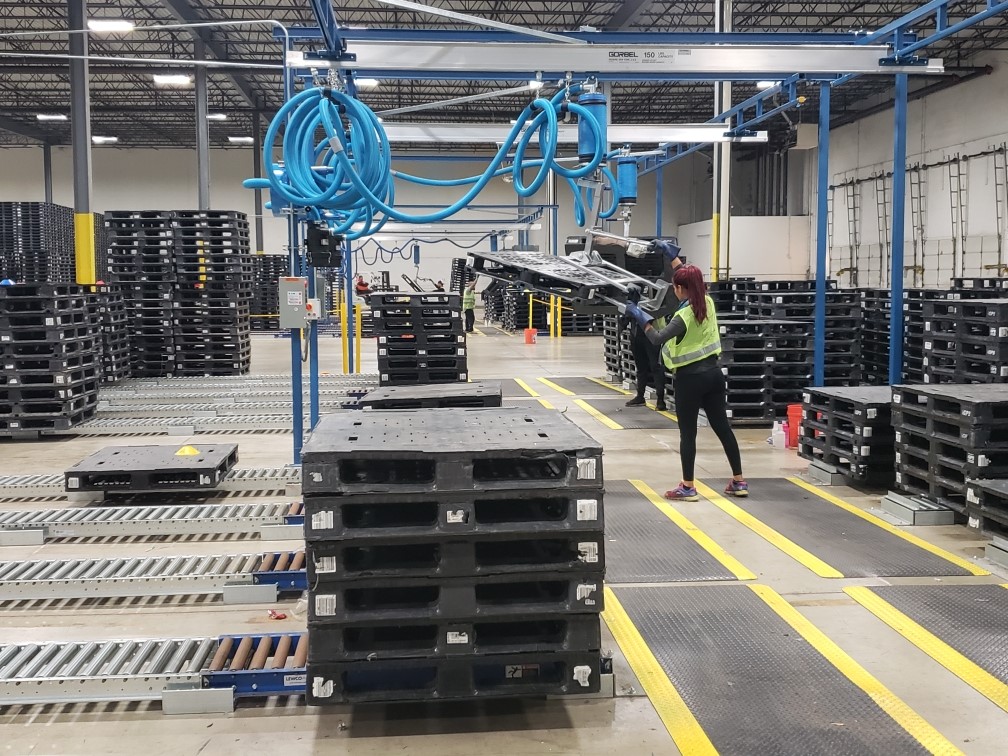Wood pallet use is sometimes spoken of as though it is a massive contributor to deforestation, but that’s not quite accurate. Wood pallets do require the harvest of natural resources, but many wood pallet manufacturers are seeking to make their practices more sustainable. Companies still using wood pallets in their supply chain and looking to reduce the environmental impact of wooden pallets should seek out pallet manufacturers that adhere to ecologically responsible practices, like planting trees and using softwood rather than hardwood.
An even better option is to avoid wood entirely by switching to plastic pallets. They require little use of natural resources and are easily recyclable. Pairing plastic pallets with a pooling model in which pallets are rented rather than owned is possibly the best way to make your supply chain practices sustainable.
Measuring the Environmental Impact of Wooden Pallets

Wood pallets are a staple in the supply chain, but they aren’t exactly environmentally friendly. They remove carbon-sequestering trees from the environment, contribute to overflowing landfills, and perpetuate the wasteful linear supply chain model in which items are eventually discarded. However, there are ways to lessen the environmental impact of wood pallets.
- Choose responsible suppliers: One way to discourage deforestation and irresponsible logging is to work only with companies that follow selective harvesting policies. A good company will plant a tree for every one that is cut down, avoid clear-cutting, and try to manage logging operations in a way that minimizes damage to the forest ecosystem. These practices help limit the impact of logging and can lessen erosion and slow habitat loss.
- Opt for softwood over hardwood: It takes 80-100 years for hardwood trees, like oak or ash, to reach maturity, yet a hardwood block pallet has a useful life of only about 15-20 trips through the supply chain. Softwood trees, on the other hand, grow more quickly, lessening the time between harvest and full replacement.
- Work with pallet recyclers: After a few repairs, most wood pallets wind up in landfills where they create hazardous conditions and take up space. However, old wood pallets can be recycled into mulch that is used in landscaping and gardening. Doing so keeps bulky waste out of landfills and puts old pallets to use.
Wood is not the best pallet material for companies looking to build a sustainable, circular business model.
While it’s important to consider the environmental impact of wooden pallets and look for ways to lessen their negative effects, wood is not the best pallet material for companies looking to build a sustainable, circular business model. Pooled plastic pallets offer a number of advantages that make them both more sustainable and more cost-effective than traditional wood pallets.
Pooled Plastic Pallets as a Cleaner, Greener Alternative

While wood pallets are “downcycled” at the end of their lifespans, high-quality plastic pallets never leave the supply chain. Instead, when they’re irreparably damaged or reach the end of their useful lives, they’re simply molded into “new” pallets. This is a classic example of a truly circular business model.
A pooling model serves to improve fuel efficiency and minimize carbon emissions.
Plastic pallet pooling is a business model built on ensuring resources are used to their maximum potential. Manufacturers, warehouses, and retailers rent bulk plastic pallets from a pallet pooling provider as needed. The pooling company manages pallet supply, retrieval, and maintenance, making pallet logistics simple. The pooling model also serves to improve fuel efficiency and minimize carbon emissions, as the pooling company is able to coordinate pallet transportation between depots and customers for optimal efficiency.
The environmental impact of wooden pallets is often overstated. However, these pallets certainly aren’t the most sustainable platform choice, either. Put simply, wood can only be reused a limited number of times before it loses its integrity, while recyclable plastic pallets offer the possibility of a truly circular pallet supply model. Supply chain managers looking to lessen the effects of their operations on the environment should look to plastic pallet pooling as a sustainable, closed-loop option.
Renting iGPS plastic pallets helps companies reduce their impact on the environment. To learn more about how pooled plastic pallets can support a circular supply chain, contact us at 1-800-884-0225, email a specialist at switch@igps.net, or visit our contact page.



